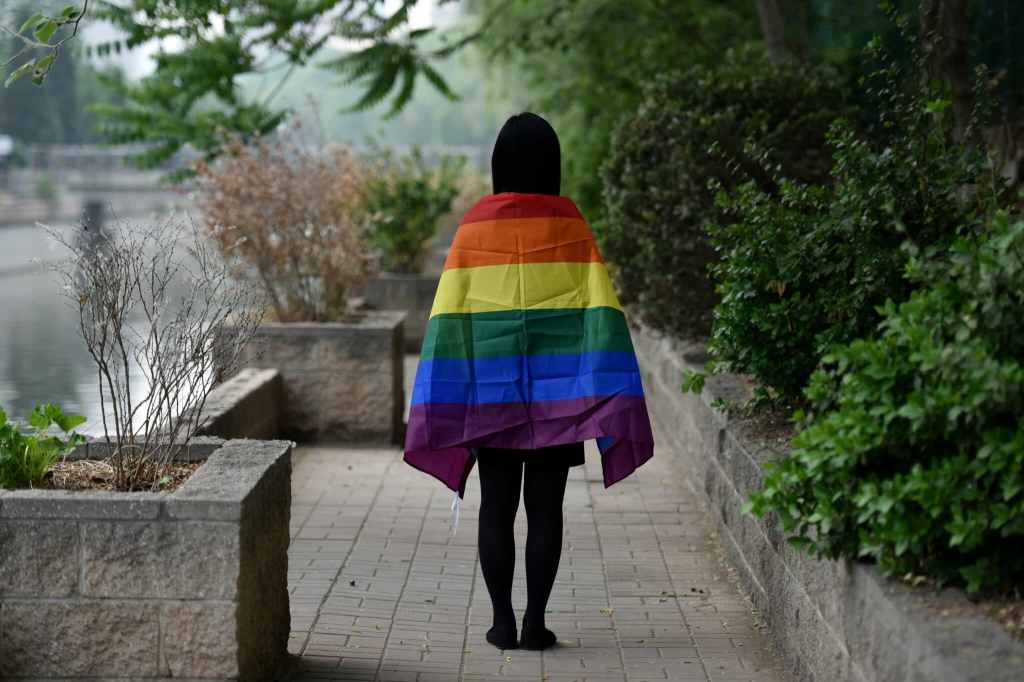US TikTok users are joking about moving to China ahead of ban – what are LGBTQ+ rights like there?

People in the US are joking about moving to China so they can still use TikTok, but it might not be a very good idea if you’re queer (Tiktok @gabriella.rose.music/ Getty)
Popular, Chinese-owned video sharing app TikTok is set to be banned in America on 19 January, dismaying the platform’s 150 million monthly active users in the US, including LGBTQ+ content creators.
The ban has been looming since President Biden signed the Protecting Americans from Foreign Adversary Controlled Applications Act, last year, after US intelligence officials warned that TikTok’s parent company, ByteDance, might be a security risk – as they’re based in China, with fears the app may push pro-Chinese propaganda to users. ByteDance were given nine months to sell the app to an American buyer or be banned.
Many US TikTok users, angry about the ban and also the perceived anti-Chinese sentiment behind it, decided to flock to similar China-based app Xiaohongshu, called “RedNote” in English, sending it flying to the top of the Apple’s App Store’s Top Free Apps chart, LGBTQ+ Nation reports.
However, the pointed move to RedNote could backfire for queer users, as unfortunately the Chinese government is not known for its enthusiastic support of LGBTQ+ rights. Quite the opposite, in fact.
Some US RedNote users have expressed concern that the Chinese-owned app may censor queer content. The Advocate recently reported that at least one “TikTok refugee” had claimed that she’d been banned from RedNote for a video mentioning “trans plight.”
However, others say that they’ve not had any issues accessing LGBTQ+ content, with one writing on Reddit: “There are tons of popular LGBT accounts. You get banned if you talk s**t about Chinese government tho.”
Some TikTok users have gone even further, with many – queer and straight alike – posting videos joking that they’re going to move to China if a ban comes into place, so that they can continue using their fave platform.
@gabriella.rose.music pulling out my dusty musty resume ig ….anyways follow me on instagram @gabriella.rose.music #fyp#funny#gabriellarose#instagramreels#fypシ ♬ original sound – JamieJL651
To make sense of all of this, it’s probably worth looking at the wider context about what rights LGBTQ+ people do – and don’t – have in China, and the restrictions queer people face there.
LGBTQ+ rights in China

Let’s start with the “good” news: first of all, same-sex sexual activity has been entirely legal in China since 1997, and homosexuality was declassified as a mental illness in 2001. However, life certainly isn’t all sunshine and rainbows for LGBTQ+ people in China: they still lack significant legal recognition and protections.
One major right that queer Chinese people don’t have is the right to equal marriage, despite several attempts to challenge this in the courts. In 2016, a gay couple called Sun Wenlin and Hu Mingliang filed a lawsuit attempting to secure the right to marry in the country’s first same-sex marriage case – a judge rejected it.
In 2017, a “legal guardianship” system was introduced, allowing adults to appoint guardians for personal and property matters. Some same-sex couples used it to give their partners legal protection.
In 2019, Li Chenyang, assistant director of a public notary office in Shanghai, told Chinese site Sohu that he had seen “one or two same-sex couples almost every month” coming to apply for guardianship notarisation.
He said that many LGBTQ+ people in China are not in touch with their biological families, who would otherwise make these decisions, because they don’t accept their sexual orientation. “We do notarisation, but also hope to make up for some legal gaps and solve the social problems that have arisen,” he added.
China also lacks comprehensive anti-discrimination laws relating to sexual orientation or gender identity, which leaves LGBTQ+ individuals vulnerable to discrimination in employment, education and healthcare.
This lack of protection has caused many LGBTQ+ Chinese people to struggle with their mental health. Around 85% of LGBTQ+ students in China reported struggling with depression, according to a 2019 survey. The poll, carried out by Beijing Normal University, also found a further 40% had considered suicide.

LGBTQ+ organisations also face challenges. In 2020, the country’s longest-running LGBTQ+ celebration, Shanghai Pride, was cancelled, having taken place every year for more than a decade. A source told CNN at the time that the volunteer-led team at Shanghai Pride cancelled it following pressure from local authorities.
Then, in 2021 a major LGBTQ+ advocacy group in China that was fighting legal battles for the queer community was shut down amid fears of a government crackdown. Also in 2021, it was reported that the social media platform WeChat, which has over a billion users, had been “wiping out” LGBTQ+ accounts.
Later that year, in a fresh blow to LGBTQ+ rights in China, the Chinese government banned “sissy” effeminate men from appearing on TV, insisting broadcasters must only “vigorously promote excellent Chinese traditional culture”, as well as video games featuring same-sex relationships.
And in 2024, Roxie, a renowned lesbian bar in Shanghai, closed its doors after nine years. The sudden closure sparked speculation about possible government pressure, symbolising the tightening political atmosphere in China under Xi Jinping, marked by a conservative shift and increased control over social behaviours.
In short, things might not be great for LGBTQ+ people in the US at the moment, but moving to China – even if you really miss TikTok – probably isn’t the best idea if you’re queer.
How did this story make you feel?

